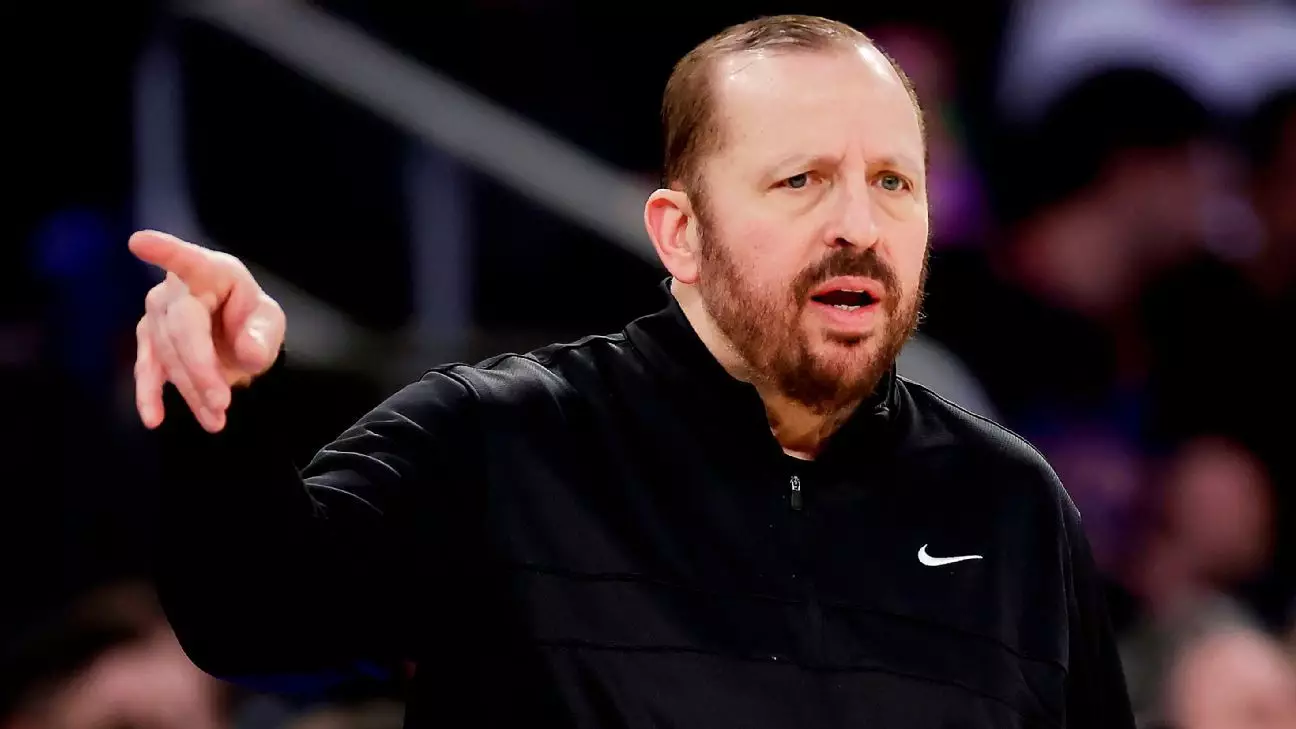In a move that has reverberated throughout the basketball community, the New York Knicks made headlines by parting ways with head coach Tom Thibodeau just three days after an admirable playoff run. This decision raises fundamental questions about the nature of success in professional sports. Despite guiding the Knicks to their most significant playoff achievement in a quarter-century, the organization has opted for a fresh direction. Thibodeau’s dismissal symbolizes a complicated intersection of expectation, tradition, and an irrepressible desire for excellence in the fiercely competitive NBA landscape.
Hailing from a rich history that intertwines with the legacy of the Knicks, Thibodeau had a commendable record. He led the team to back-to-back 50-win seasons, a feat not accomplished since 1995, and finished as the fourth-winningest coach in franchise history after surpassing coaching legends like Pat Riley. However, this impressive resume contrasts starkly with the organization’s decision. It highlights an intriguing paradigm wherein past successes are overshadowed by the insatiable thirst for a championship.
An Unforgiving Playoff Exit
The Knicks’ exit from the Eastern Conference Finals at the hands of the Indiana Pacers marked a culmination of their unexpected playoff journey. The team stormed through the earlier rounds, notably stunning the defending champion Boston Celtics despite a dismal regular-season record against them. This stark contrast between their playoff resilience and regular-season struggles adds layers to Thibodeau’s departure. Should a team’s trajectory hinge solely on playoff outcomes, particularly for clubs blessed with deep-rooted rivalries like New York and Indiana?
Moreover, the playoff exit brings to light the strategic choices made by the coaching staff. Thibodeau’s infamous tendency to heavily rely on his starters meant they logged more minutes than any other group in the league, raising questions about his approach toward player management in an era increasingly defined by load management. While championship aspirations necessitate a competitive edge, Thibodeau’s method resulted in a lack of depth that was painfully exposed in crucial moments.
The Influence of Legacy and Family Ties
The narrative surrounding Thibodeau also invokes the theme of loyalty, particularly concerning the ties he has with key players, such as Jalen Brunson and Rick Brunson. Thibodeau’s longstanding relationship with the organization, including his history as an assistant coach, adds another layer of emotional complexity to his firing. Jalen Brunson’s unequivocal endorsement of Thibodeau showcases the challenge that franchises face when making decisions that seem to contradict personal loyalties and team morale.
For players like Brunson, who have deeply rooted connections to their coach, Thibodeau’s dismissal is more than just a tactical recalibration. It forces them to confront the reality that basketball is a business where heart and soul often take a backseat to cold statistics and organizational ambitions. The relationships developed over years can be shattered in a moment, leaving both players and fans grappling with the reasons behind such drastic decisions.
Looking Ahead: The Knicks’ Next Steps
With the franchise’s ambitions set on securing a championship, the focus now shifts to who will replace Thibodeau. The Knicks’ management, led by President Leon Rose, underscore their commitment to building a winning culture that prioritizes their loyal fanbase. The successful maneuvers in recent trades, including obtaining Karl-Anthony Towns, reflect a larger strategy aimed not just at immediate successes but at sustaining competitiveness in the long run.
However, the question remains: who can navigate the thin line between utilizing star talent and maintaining a balanced roster capable of withstanding the rigors of the playoffs? As teams continue to evolve, the Knicks’ front office faces the paradox of preserving the core principles of their franchise while introducing a new vision that resonates with both players and fans alike.
In an environment where every loss can be seen as a precursor to a coach’s demise, the Knicks’ decision embodies the duality of success and expectation, reminding us that in sports, even the most spirited fights can end unexpectedly and dramatically. Will the Knicks find their way back to the promise of a championship while grappling with the ghosts of their past? Only time will tell.

